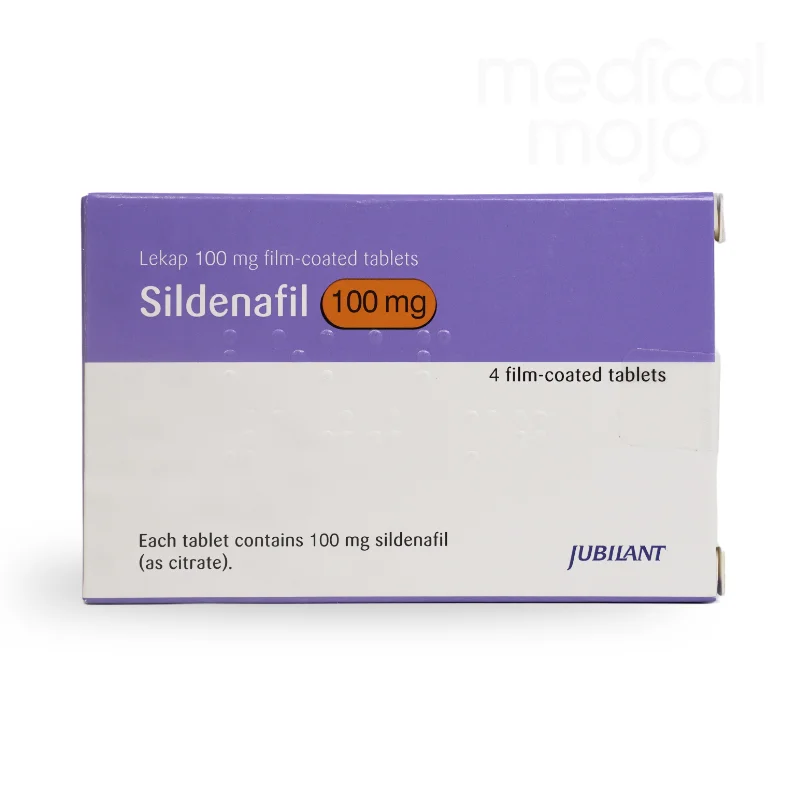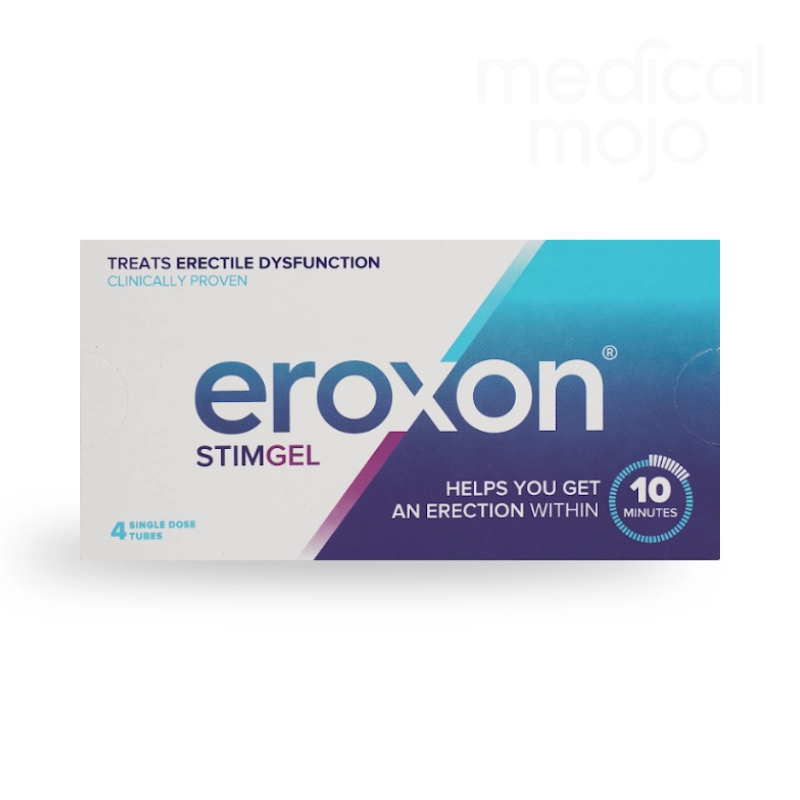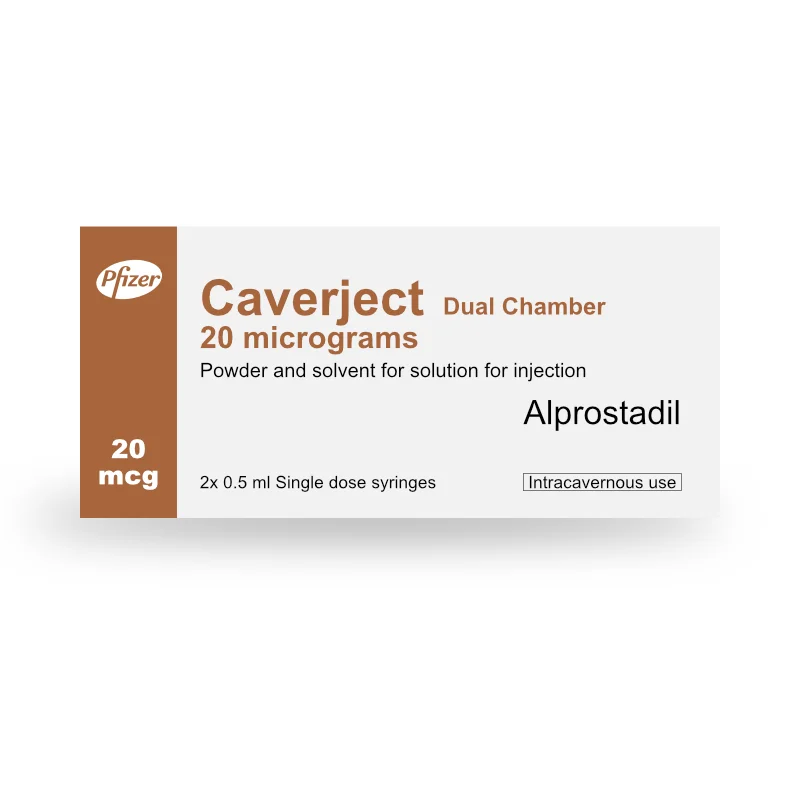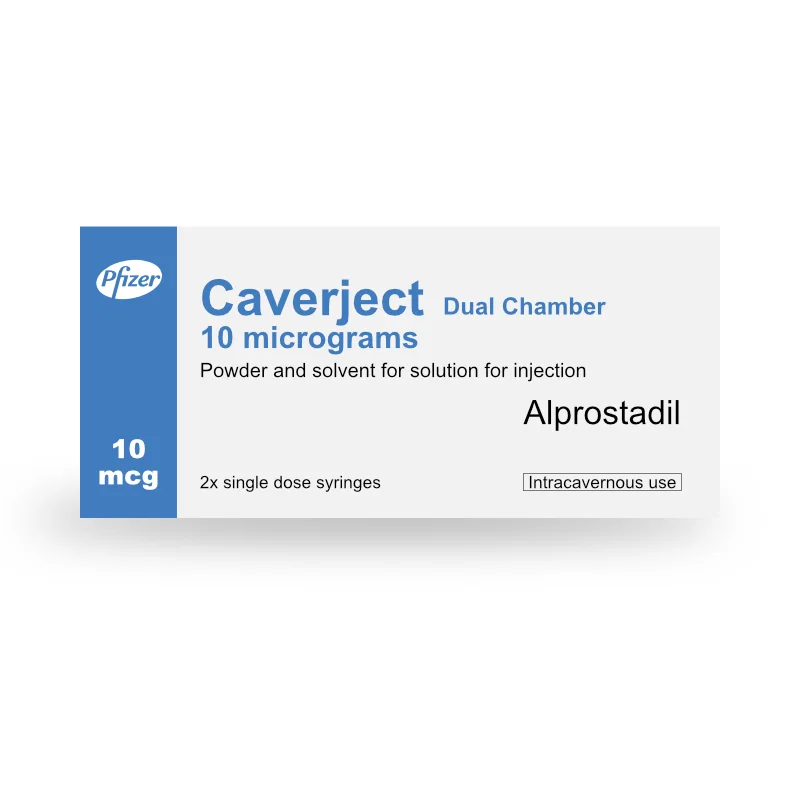Sildenafil 100mg Tablets
from£9.99
Sildenafil 100mg tablets are prescribed for the treatment of erectile dysfunction (ED) in men. By inhibiting the enzyme phosphodiesterase type 5 (PDE5), sildenafil enhances blood flow to the penis during sexual stimulation, helping to achieve and maintain an erection. This lower dosage is often recommended for individuals who are new to sildenafil treatment, have underlying health conditions, or are taking other medications that might interact with higher doses. It is taken approximately 30 to 60 minutes before sexual activity and is effective for up to four hours.
As with all medications, it should be used under the guidance of a healthcare professional to ensure safety and efficacy.
TREATS:
Erectile Dysfunction
FORMAT:
Tablet
Availability:
In stock
Watch
Watch
Description
What are Sildenafil 100mg tablets?
Sildenafil 100mg tablets are prescribed for the treatment of erectile dysfunction (ED) in men. By inhibiting the enzyme phosphodiesterase type 5 (PDE5), sildenafil enhances blood flow to the penis during sexual stimulation, helping to achieve and maintain an erection. This lower dosage is often recommended for individuals who are new to sildenafil treatment, have underlying health conditions, or are taking other medications that might interact with higher doses. It is taken approximately 30 to 60 minutes before sexual activity and is effective for up to four hours. As with all medications, it should be used under the guidance of a healthcare professional to ensure safety and efficacy.
Active Ingredient in Sildenafil 100mg tablets
Each tablet contains sildenafil citrate 100mg.
What are Sildenafil 100mg tablets used for?
The drug is available as the branded version of Viagra for men, and also is generic, and both are equally effective. The generic name is sildenafil citrate and like Viagra it is a phosphodiesterase-5 (PDE-5)inhibitor. PDE-5 breaks down cGMP, which normally leads to the relaxation of the smooth muscle cells and a decrease in blood flow to the penis. By inhibiting PDE-5, sildenafil helps to maintain the levels of cGMP in the penis, allowing the smooth muscle cells to remain relaxed and the blood vessels to remain dilated, resulting in an erection.
When used to treat erectile dysfunction (ED), sildenafil helps by improving blood flow to the penis. This boosts its ability to achieve and sustain an erection during sexual intercourse.
Sildenafil is available in tablet form and is typically taken orally, typically as needed. It should be taken about an hour before sexual activity and can be taken with or without food.
How do Sildenafil100mg tablets work?
Sildenafil is a selective inhibitor of phosphodiesterase type 5 (PDE5). By inhibiting PDE5, sildenafil enhances the effects of nitric oxide (NO) released during sexual stimulation. This leads to increased levels of cyclic guanosine monophosphate (cGMP) in the corpus cavernosum, resulting in smooth muscle relaxation and inflow of blood to the penile tissues, thereby facilitating erection.
How to use Sildenafil 100mg tablets?
The recommended dose is 25mg taken as needed approximately 30 to 60 minutes before sexual activity. Sildenafil 100mg tablets can be taken with or without food. However, a high-fat meal may delay the onset of action. The maximum recommended dosing frequency is once per day.
Who cannot take Sildenafil 100mg tablets?
Sildenafil 100mg tablets are used to treat erectile dysfunction (ED) in men. Before prescribing sildenafil 100mg tablets, healthcare providers typically assess a patient’s suitability for the medication through a questionnaire or consultation. Certain conditions may require additional evaluation or make sildenafil 100mg tablets inappropriate for use.
Men with the following conditions should not take sildenafil 100mg tablets without further assessment from their primary care doctor:
- Taking nitrate medications (commonly used for chest pain)
- Taking or planning to take amyl nitrite (“poppers”)
- Taking riociguat (a medication used to treat high blood pressure in the lungs)
- Low or high blood pressure
- Allergies or reactions to previous ED treatments
- Recent heart attack (within the past 6 weeks), angina (chest pain with exertion), or other heart conditions
- History of strokes or transient ischemic attacks (mini-strokes)
- History of vision problems caused by circulation issues
- Family history of rare degenerative eye disease
- Serious kidney or liver disease
- Peyronie’s disease (a condition characterized by curvature or deformity of the penis)
- Leukemia, multiple myeloma, or sickle cell disease
- Bleeding disorders (such as hemophilia)
- Active stomach ulcers (peptic or gastric ulcers)
- Lactose intolerance (sildenafil 100mg tablets contain lactose)
There is also a rare risk of abnormal heart rhythm if sildenafil 100mg tablets are taken with certain other medications. It is important to discuss any potential drug interactions with your healthcare provider.
Sildenafil 100mg tablets should not be used in patients with a known hypersensitivity to sildenafil or any of the excipients. It is also contraindicated in patients using nitrates or nitric oxide donors, as the combination can lead to a severe drop in blood pressure.
Warnings and precautions before taking Sildenafil 100mg tablets
Prior to initiating treatment with sildenafil, a thorough medical history and physical examination should be performed to diagnose erectile dysfunction and determine potential underlying causes. Caution is advised in patients with cardiovascular disease, anatomical deformation of the penis, or a predisposition to priapism. Patients should be advised to seek immediate medical attention if an erection lasts longer than 4 hours.
Side effects of Sildenafil 100mg tablets
Sildenafil 100mg tablets are generally well tolerated and have few significant side effects for most users. They work by increasing blood flow, which can sometimes affect other parts of the body, though these effects are usually mild. Most people who experience side effects continue taking the medication without issues.
Common side effects of Sildenafil 100mg tablets include headache, flushing, indigestion, visual disturbances, nasal congestion, and dizziness. These side effects can typically be managed with simple remedies or over-the-counter medications.
In rare cases, serious side effects can occur, such as chest pains (which may indicate a heart attack), loss of vision, and a prolonged and painful erection. If you experience any of these symptoms, seek immediate medical attention. Prolonged erections, known as priapism, can cause permanent damage to the penis and require emergency treatment.
The full range of side effects is listed in the patient information leaflet included with the medication. It is important to read this information and discuss any concerns with your healthcare provider.
Drug Interactions with Sildenafil 100mg tablets
Sildenafil 100mg tablets, used primarily for the treatment of erectile dysfunction, can interact with various other medications. These interactions may alter the effectiveness of sildenafil or increase the risk of adverse side effects. It is essential to inform your healthcare provider about all the medications you are currently taking, including prescription, over-the-counter drugs, and herbal supplements.
- Nitrate Medications:
- Examples: Nitroglycerin, isosorbide dinitrate, isosorbide mononitrate
- Effect: Severe drop in blood pressure which can be life-threatening
- Note: Avoid use of sildenafil with any form of nitrate medication.
- Alpha-Blockers:
- Examples: Doxazosin, tamsulosin
- Effect: Significant drop in blood pressure leading to dizziness or fainting
- Note: Use with caution and only under medical supervision.
- Antihypertensives:
- Examples: Amlodipine, enalapril
- Effect: Enhanced blood pressure-lowering effects, increasing the risk of hypotension
- Note: Monitor blood pressure regularly.
- Protease Inhibitors (used for HIV):
- Examples: Ritonavir, saquinavir
- Effect: Increased blood levels of sildenafil, leading to increased risk of side effects
- Note: Dose adjustment of sildenafil may be necessary.
- Antifungal Medications:
- Examples: Ketoconazole, itraconazole
- Effect: Increased sildenafil levels in the blood
- Note: Dose adjustment of sildenafil may be required.
- Antibiotics:
- Examples: Erythromycin, clarithromycin
- Effect: Increased plasma levels of sildenafil, enhancing side effects
- Note: Consult with your healthcare provider for possible dose adjustments.
- Rifampin (an antibiotic used for tuberculosis):
- Effect: Decreased effectiveness of sildenafil due to increased metabolism
- Note: May need a higher dose of sildenafil.
- Other ED Medications:
- Examples: Tadalafil, vardenafil
- Effect: Increased risk of severe side effects such as prolonged erection (priapism)
- Note: Do not combine sildenafil with other erectile dysfunction treatments.
- Grapefruit Juice:
- Effect: Increases blood levels of sildenafil, leading to enhanced effects and side effects
- Note: Avoid consuming grapefruit juice while taking sildenafil.
- Alcohol:
- Effect: Can increase the likelihood of side effects like dizziness and lower blood pressure
- Note: Limit alcohol intake while using sildenafil.
Special Considerations
- Age and Other Medical Conditions: Older adults and those with certain medical conditions may be more sensitive to the effects of drug interactions. Always discuss your full medical history with your healthcare provider.
- Monitoring: Regular monitoring by a healthcare provider is recommended when sildenafil is used in combination with other medications.
- Emergencies: Seek immediate medical attention if you experience severe side effects or signs of a serious interaction, such as chest pain, severe dizziness, or prolonged erection.
By understanding these potential drug interactions, you can use sildenafil 100mg tablets more safely and effectively. Always consult with your healthcare provider for personalized advice and recommendations
FAQs about Sildenafil 100mg tablets
Why do men get erectile dysfunction?
Erectile dysfunction (ED), also known as impotence, is a common condition affecting many men. The causes of ED can be broadly categorized into physical, psychological, and lifestyle factors. Here are some key reasons why men might experience ED:
- Physical Causes
- Cardiovascular Diseases: Conditions like atherosclerosis (narrowing of the arteries), high blood pressure, and heart disease can reduce blood flow to the penis, making it difficult to achieve an erection.
- Diabetes: High blood sugar levels associated with diabetes can damage blood vessels and nerves that control an erection.
- Obesity: Excessive body weight can lead to cardiovascular diseases and diabetes, which are linked to ED.
- Hormonal Imbalances: Low levels of testosterone or other hormonal imbalances can affect sexual desire and function.
- Neurological Disorders: Conditions like Parkinson’s disease, multiple sclerosis, and spinal cord injuries can interfere with nerve signals necessary for an erection.
- Medications: Certain medications, including those for high blood pressure, depression, and other conditions, can cause ED as a side effect.
- Psychological Causes
- Stress and Anxiety: High levels of stress and anxiety can affect sexual performance.
- Depression: Depression can reduce sexual desire and lead to ED.
- Relationship Problems: Issues such as poor communication, unresolved conflicts, and lack of intimacy can contribute to ED.
- Lifestyle Factors
- Smoking: Smoking can damage blood vessels and restrict blood flow to the penis.
- Excessive Alcohol Consumption: Heavy drinking can interfere with the ability to get an erection.
- Drug Use: The use of recreational drugs can impair sexual function.
- Lack of Exercise: Physical inactivity can lead to obesity and cardiovascular diseases, which are linked to ED.
Seeking HelpIf you are experiencing ED, it is important to speak with your primary care doctor. They can conduct an assessment, perform necessary tests, and provide advice on the best course of treatment. Doctors are trained to handle issues related to ED and understand the sensitivity of the condition.For more detailed information, consulting medical resources or speaking with a healthcare professional is recommended.
Do Sildenafil 100mg tablets work every time?
It is recommended to try sildenafil 100mg tablets at least 4 times before determining their effectiveness for treating erectile dysfunction (ED) and before considering a dosage change or switching to a different ED medication. It is important to note that sildenafil 100mg tablets and other ED medications may not work for everyone and may not always address the underlying cause of ED.Several factors contribute to the ability to achieve and maintain an erection, including adequate blood supply, arousal, and a healthy nervous system. If ED is due to spinal injury or surgery, nerve damage may be present, and sildenafil 100mg tablets may only offer partial relief. In such cases, other treatments like injections or penile implants may be necessary.For men with psychological causes of ED, counseling may be an effective treatment option in addition to or instead of medication. It is important to work with a healthcare provider to identify the underlying cause of ED and determine the most appropriate treatment plan.
What is Sildenafil 100mg used for?
Sildenafil 100mg tablets are used to treat erectile dysfunction (ED) in men. They help to achieve and maintain an erection by increasing blood flow to the penis during sexual stimulation.
How should I take Sildenafil 100mg tablets?
Take one tablet approximately one hour before planned sexual activity. Swallow the tablet whole with water. You can take it with or without food, but it may take longer to work if taken with a high-fat meal.
How often can I take Sildenafil 100mg tablets?
Do not take sildenafil more than once a day. Allow at least 24 hours between doses.
How long does it take for Sildenafil 100mg tablets to work?
Sildenafil usually starts working within 30 to 60 minutes. The effects can last for up to four hours, but this does not mean that you will have an erection for this entire period.
What are the possible side effects of Sildenafil 100mg tablets?
Common side effects include headache, flushing, indigestion, nasal congestion, dizziness, and visual disturbances. Rare but serious side effects include chest pain, sudden vision loss, and prolonged erection (priapism).
Can I take Sildenafil 100mg tablets with alcohol?
It’s advisable to avoid excessive alcohol consumption when taking sildenafil, as it can increase the likelihood of side effects and impair your ability to get an erection.
Are there any medications that interact with Sildenafil 100mg tablets?
Yes, sildenafil can interact with nitrate medications (used for chest pain), some blood pressure medications, certain antibiotics, antifungal drugs, and HIV protease inhibitors. Always inform your healthcare provider about all the medications you are taking.
Can I take Sildenafil 100mg if I have a heart condition?
If you have a heart condition, it’s important to consult your doctor before taking sildenafil. It may not be safe for people with certain heart problems.
What should I do if I miss a dose of Sildenafil 100mg?
Sildenafil is taken as needed, so you are not likely to miss a dose. Do not take a double dose to make up for a missed one.
Can women take Sildenafil 100mg tablets?
Sildenafil is not approved for use in women. There are other treatments available for female sexual dysfunction.
What should I do if I experience a prolonged erection?
If you have an erection that lasts more than four hours, seek immediate medical attention. This condition, known as priapism, can cause permanent damage to the penis.
Can I take Sildenafil 100mg with other ED medications?
No, do not take sildenafil with other ED medications without consulting your doctor. Combining these medications can increase the risk of severe side effects.
How should I store Sildenafil 100mg tablets?
Store sildenafil at room temperature, away from moisture and heat. Keep the tablets in their original packaging until you are ready to take one.
What should I do if I overdose on Sildenafil 100mg tablets?
If you suspect an overdose, seek emergency medical attention immediately. Symptoms of overdose may include severe dizziness, fainting, or prolonged erection.
What are PDE5 inhibitors?
PDE-5 inhibitors are a class of medications that block the action of an enzyme called phosphodiesterase-5 (PDE-5). This enzyme regulates blood flow in the penis and can interfere with the process of achieving and maintaining an erection. By inhibiting PDE-5, these medications help increase blood flow to the penis, aiding men with erectile dysfunction (ED) in achieving and maintaining an erection.PDE-5 inhibitors are primarily used to treat ED, but they are also effective for other conditions such as pulmonary arterial hypertension (PAH). Common examples of PDE-5 inhibitors include sildenafil (Viagra), tadalafil (Cialis), vardenafil (Levitra), and avanafil (Stendra). These medications are taken orally and are generally well tolerated, although side effects can occur in some individuals.It’s important to note that PDE-5 inhibitors do not work for everyone and are not a cure for ED. They are most effective when used in conjunction with other treatments, such as lifestyle changes and counseling.
Additional information
| Quantity | 4 tablets, 8 tablets, 12 tablets, 16 tablets, 20 tablets |
|---|











